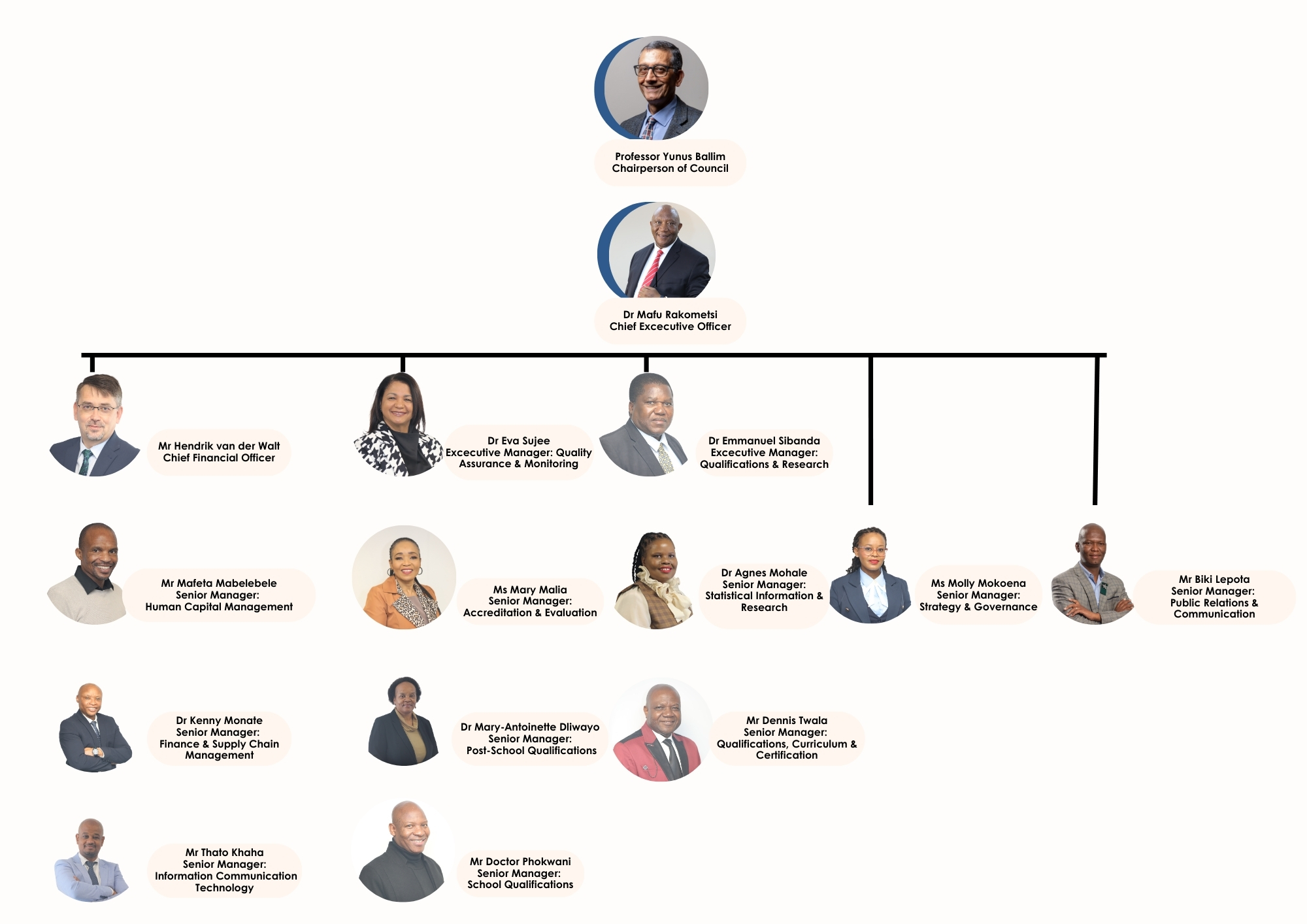Our name
Umalusi is derived from Nguni and it means “shepherd or herder.” Umalusi takes care of one of the nation`s most treasured assets – the standards of general and further education and training, hence its name. In Nguni culture ‘Umalusi’ also means the guardian of the family`s wealth.
Vision
A trusted authority in fostering high education standards in general and further education and training.
Mission
We are the quality council that assures education standards in the General and Further Education and Training Qualifications Sub-framework.
Our name
Umalusi is derived from Nguni and it means “shepherd or herder.” Umalusi takes care of one of the nation`s most treasured assets – the standards of general and further education and training, hence its name. In Nguni culture ‘Umalusi’ also means the guardian of the family`s wealth.
Vision
A trusted authority in fostering high education standards in general and further education and training.
Mission
We are the quality council that assures education standards in the General and Further Education and Training Qualifications Sub-framework.
Our values

Transparency

Professionalism

Integrity

Reliability

Impartiality
Umalusi Council Members
Umalusi Council is constituted by the General and Further Education and Training Quality Assurance Act No 58 of 2001 amended in 2008 (GENFETQA Act). The Council Chair and members are appointed by the Minister of Basic Education and consists of 15 members, appointed for their professional expertise in education and training.
In addition to the 15 members, the Chief Executive Officers of the following organizations are members by virtue of their office:
✓ South African Qualifications Authority (SAQA)
✓ The Council on Higher Education (CHE)
✓ Quality Council for Trades and Occupations (QCTO)
Umalusi Council is responsible for the development and management of a sub-framework of qualifications for general and further education and training from NQF levels 1-4 and the attendant quality assurance, research and certification processes.
The Council is also tasked with advising the two Ministers of Education on matters related to the General and Further Education and Training Qualifications Sub-framework.

The Council is accountable and responsible to the Minister of Basic Education for the performance and affairs of Umalusi.
Contact usCouncil Committees
The Council has appointed seven committees to oversee its work:
Umalusi’s role in education and training in South Africa
Umalusi Council sets and monitors standards for general and further education and training in South Africa in accordance with the National Qualifications Framework Act No 67 of 2008 [as amended] and the General and Further Education and Training Quality Assurance Act No 58 of 2001 [as amended].
The Council is tasked with the development and management of a sub-framework of qualifications for general and further education and training and for the attendant quality assurance.
In order to issue learners with certificates that are credible, Umalusi:
✓ Develops and evaluates qualifications and curricula to ensure that they
are of the expected standard;
✓ Moderates assessment to ensure that it is fair, valid and reliable;
✓ Accredits providers of education and training, and assessment;
✓ Conducts research to ensure educational quality;
✓ Verifies the authenticity of certificates.
Umalusi is currently responsible for the certification of the following qualifications:
Schools
✓ Senior Certificate (amended) (SCa) - continues as a revised qualification for adults✓ National Senior Certificate (NSC)
TVET Colleges
✓ National Technical Certificate (N3)✓ National Certificate Vocational NC(V)
Adult Learning Centres
✓ General Education and Training Certificate: Adults (GETC)Governance
Umalusi is governed and guided by the National Qualifications Act No 67 of 2008 [as amended] and its founding Act the General and Further Education and Training Quality Assurance Act No 58 of 2001 [amended in 2008]. Umalusi Council is appointed by the Minister of Basic Education to give effect to its mandate as expressed in these Acts. Umalusi also answers to the Minister of Higher Education and Training in respect of the certification of qualifications offered in TVET colleges and adult learning centres. Umalusi works in line with a five-year strategic plan agreed with the Ministers of Education. The strategic plan sets out Umalusi`s strategic priorities and performance measures. The strategic plan provides a framework for the annual business plan, which informs the Council`s day-to-day work and provides a basis for assessing performance.

Meet our Executive

Dr Mafu S Rakometsi
Chief Executive Officer

Mr Emmanuel Sibanda
Executive Manager, Qualifications & Research

Dr Eva Sujee
Executive Manager, Quality Assurance & Monitoring

Mr Hendrik van der Walt
Chief Financial Officer
Organisational structure
The Chief Executive Officer appointed by Umalusi Council oversees and provides strategic direction to the work of the organisation. Umalusi’s work is conducted through operational units that are overseen by three Executive Managers:

Executive Manager:
Qualifications and Research
Provides strategic direction to the work of the following units:
✓ Qualifications, Certification and Curriculum (QCC)
✓ Statistical Information and Research (SIR)

Executive Manager:
Quality Assurance and Monitoring
Provides strategic direction to the work of the following units:
✓ Evaluation and Accreditation (E&A)
✓ Quality Assurance of Assessment (QAA) – School Qualifications (QAA-SQ)
✓ Quality Assurance of Assessment – Post School Qualifications (QAA-PSQ)

Chief Financial Officer:
Corporate Services
Provides strategic direction to the work of the following units:
✓ Human Capital Management (HCM)
✓ Information Communications Technology (ICT)
✓ Finance and Supply Chain (F&SCM)
The work of operational units is supported by the following units located within the office of the Chief Executive Officer:
✓ Strategy and Governance (S&G)
✓ Public Relations and Communications (PR&COMMS)
Organogram: Top Structure

Related Documents: Legislation
2009
| Date | Title |
|---|---|
| 01 Oct 2009 | Promotion of Access to Information |
| 17 Feb 2009 | National Qualifications Framework Act, 2008 |
| 09 Jan 2009 | General and Further Education and Training Quality Assurance Amendment Act No 50 of 2008 |
| 11 Dec 2006 | FET Colleges Act 16 of 2006 |
| 05 Dec 2001 | General and Further Education and Training Quality Assurance Act No 58 of 2001 |
| 13 Dec 2000 | ABET Act No 52 of 2000 |
| 03 Feb 2000 | Promotion of Administrative Justice Act No 3 of 2002 |
| 15 Nov 1996 | South African Schools Act No 84 of 1996 |
| 24 Apr 1996 | National Education Policy Act 27 of 1996 |
2006
| Date | Title |
|---|---|
| 11 Dec 2006 | FET Colleges Act o 16 of 2006 |
2001
| Date | Title |
|---|---|
| 05 Dec 2001 | General and Further Education and Training Quality Assurance Act No 58 of 2001 |
2000
| Date | Title |
|---|---|
| 13 Dec 2000 | ABET Act No 52 of 2000 |
| 03 Feb 2000 | Promotion of Administrative Justice Act No 3 of 2002 |
1996
| Date | Title |
|---|---|
| 15 Nov 1996 | South African Schools Act No 84 of 1996 |
| 24 Apr 1996 | National Education Policy Act 27 of 1996 |